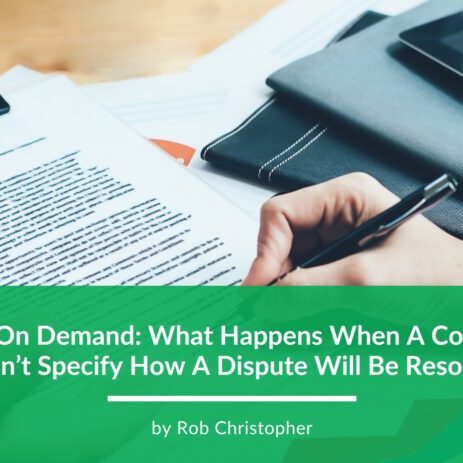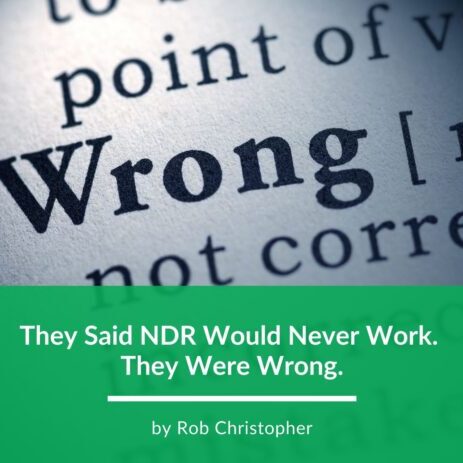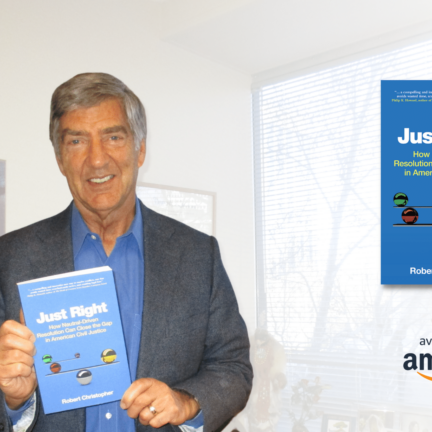“You Can’t Sue Me, We’ve Agreed to Resolve It!”

A common question we at Just Resolve have been asked is what a party can do if there is a written mutual agreement to use our “resolve” method, but then one party reneges by going to court instead. Due to Just Resolve’s similarities to other forms of dispute resolution such as mediation and Dispute Review Boards (DRBs), a party should be able to compel the other party to abide by the agreement and submit to Just Resolve’s process.
Just Resolve shares important similarities with mediation and DRBs. In mediation, the parties present arguments and settlement proposals to a mediator who tries to help them reach an amicable decision without making any independent decision on how to resolve the matter. The process is non-binding, though its goal is to conclude a binding compromise agreement. A DRB is a neutral body, used primarily in the construction industry, and often composed of at least three impartial industry professionals who are experienced in the subject matter at issue. When negotiating a project agreement, parties contractually agree to use a DRB in the event a dispute arises, and members of the DRB are then jointly selected by the owner and contractor immediately after the contract is awarded. When a dispute arises, the DRB actively investigates, neutrally advises the parties, and, depending on the parties’ agreement, either recommends or decides an outcome. Just Resolve’s process works very similar to a DRB, without the up-front overhead of paying the experts even if no dispute arises, and Just Resolve’s process can include a mediation step, all for a fixed fee without need of separate legal representation. In all three processes, the parties have contractually agreed, in writing, to engage in the designated process and there are appropriate indicia that the process will be fair to all, including that the neutral(s) are jointly selected, follow a process that appears fair on its face, are given latitude in the conduct of their efforts, and are often subject matter experts in the industry or law surrounding the dispute.
Courts tend to enforce written agreements to mediate and use the DRB process by compelling reneging parties to engage in them before proceeding with litigation, because courts have expressed a strong policy preference to have disputes resolved by the use of agreed alternatives to the court system. Indeed, California has instituted a unique rule that allows courts to refer cases to appropriate alternative dispute resolution processes such as judicial arbitration and mediation, if the amount in controversy does not exceed $50,000 for each plaintiff. There has been no major distinction in the courts in the treatment of these clauses when they prescribe a binding as opposed to a non-binding outcome. Since courts have enforced these agreements with respect to mediation and DRB, it follows that courts will also enforce agreements containing Just Resolve’s neutral-driven approach.
Ultimately, although there is no guaranteeing what a court will decide in every situation, Just Resolve’s neutral-driven ADR process should receive the same judicial treatment as other comparable ADR processes. That is, a court will likely compel parties who have agreed to participate in the process to complete it before proceeding with any litigation.
More to read
NDR on Demand: What Happens When a Contract Doesn’t Specify How a Dispute Will Be Resolved?
The best way to deter threats of litigation and minimize the costs, duration, and distractions of resolving any dispute is to put a dispute resolution clause specifying NDR — Neutral-Driven Resolution — in all your contracts BEFORE there is a problem. That means that if a dispute should arise between a business and a contractor,…
They Said NDR Would Never Work. They Were Wrong.
Many people are surprised by how effective NDR can be. Since publishing my book and speaking at events about NDR (Neutral-Driven Resolution), I’ve often been asked a simple question: Does it work? And if it really does lower the costs and the time it takes to settle common disputes, why doesn’t everybody know about…
“Morgan Hill author releases new book”
The Morgan Hill Times featured Rob’s new book in an article ahead of his “Meet the Author” night at Booksmart. “Legal disputes and conflicts cost businesses billions of dollars a year in lawyers’ fees, lost productivity, time and aggravation. A new book by Morgan Hill author Robert Christopher proposes an innovative, faster and simpler way…
Not All Disputes are Equal
Not all business and legal disputes are alike, and not all of them can be resolved in the same way. In writing my book Just Right: How Neutral-Driven Resolution Can Close the Gap in American Civil Justice, it was important to distinguish the types of common disputes for which NDR is most suitable. As readers…



